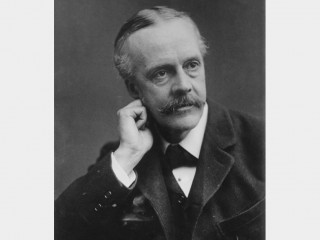
Arthur Balfour biography
Date of birth : 1848-07-25
Date of death : 1930-03-19
Birthplace : East Lothian, Scotland
Nationality : British
Category : Politics
Last modified : 2010-12-13
Credited as : Statesman and philosopher, prime minister of Great Britain,
The British statesman and philosopher Arthur James Balfour, 1st Earl of Balfour, was prime minister of Great Britain. He later was chiefly responsible for the Balfour Declaration, favoring the establishment of Palestine as the national Jewish home.
Arthur James Balfour was born on July 25, 1848, at Whittinghame House, East Lothian, Scotland, the son of James Maitland Balfour, a country gentleman, and Lady Blanche Balfour, daughter of the 2d Marquess of Salisbury. Well educated, strong-minded, and evangelical in outlook, Lady Blanche dominated the early years of her children. Balfour was educated at Eton and at Trinity College, Cambridge.
Balfour pursued two careers, philosophy and politics, often simultaneously. As a metaphysician, his main concern was to find bases for modern religious belief. The doctrine of naturalism repelled him; he believed that one should be no more skeptical about religion than about science. His writings include A Defense of Philosophical Doubt (1879), Foundations of Belief (1896), and most important, his Gifford Lectures at the University of Glasgow, published as Theism and Humanism (1915) and Theism and Thought (1923). His scholarly honors were legion, including the presidency of the British Association for the Advancement of Science (1904) and of the British Academy (1921). In 1891 he was named chancellor of Edinburgh University and in 1919 chancellor of Cambridge. His cultivation of mind, social graces, and gift for conversation brought him a prestige in English life for which, it is said, one must go back to the 18th century British statesman Charles James Fox for an equal. He never married.
At the suggestion of his uncle, Lord Salisbury, Balfour entered politics and won a Conservative seat in the House of Commons in 1874. As parliamentary private secretary he accompanied Salisbury, now foreign secretary, to the Congress of Berlin in 1878. Balfour's own parliamentary gifts were not fully revealed until the Salisbury administration (1886-1892). Balfour served successively as secretary for Scotland, as chief secretary for Ireland (he restored order and enacted salutary land reforms), and finally in 1891 as first lord of the Treasury and leader of the House of Commons. When Salisbury retired in 1902 during his second administration, the succession as prime minister fell naturally to Balfour.
During his own government (1902-1905) Balfour proved more successful as a statesman than as a politician. His leadership brought proposals for military reform and legislation of monumental significance: the Education Act of 1902, unifying elementary education, and the Irish Land Act of 1903, greatly simulating outright ownership of land by Irish peasants. Also there came an end to diplomatic
isolation, with the Entente Cordiale with France (1904) and the Anglo-Japanese Alliance (1905). But when Joseph Chamberlain challenged the sacred doctrine of free trade, splitting the party asunder, Balfour proved incapable either of restoring unity or indeed of developing a policy; the Conservatives, including Balfour, suffered total defeat in the election of 1906. A safe seat from the City of London was soon found for Balfour, who directed Conservative efforts to block the Liberal government's legislation program of fiscal and social reform. With the Parliament Act of 1911, which limited the role of the Lords, it was clear that Balfour had failed and he resigned the party leadership.
Balfour's political career was by no means at an end, however. In 1915 he joined the coalition War Cabinet as first lord of the Admiralty and was foreign secretary in the Lloyd George Cabinet. Balfour was largely responsible for the declaration (1917) which bears his name, authorized by the War Cabinet and affirming British support for a Jewish national home in Palestine. At the peace conference after World War I Balfour was active in the Council of Ten. In 1919 he shifted to the office of lord president of the Council and rendered distinguished service at the Washington Arms Conference (1922). He was created an earl in 1922. He presented the Balfour Report at the Imperial Conference of 1926, enunciating the doctrine of "equality of status" of the Dominions with Great Britain, which was formalized in the Statute of Westminster in 1931. Lord Balfour left office in 1929. He died on March 19, 1930.
Kenneth Young, Arthur James Balfour (1963), is the standard biography. An older, more personal treatment is Blanche E. C. Dugdale, Arthur James Balfour, First Earl of Balfour (2 vols., 1936). For special topics consult Denis Judd, Balfour and the British Empire (1968), and Alfred Gollin, Balfour's Burden (1965), a study of the tariff issue during 1903-1905.
















